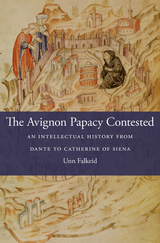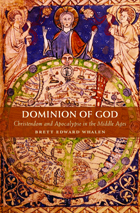
The Avignon papacy (1309–1377) represented the zenith of papal power in Europe. The Roman curia’s move to southern France enlarged its bureaucracy, centralized its authority, and initiated closer contact with secular institutions. The pope’s presence also attracted leading minds to Avignon, transforming a modest city into a cosmopolitan center of learning. But a crisis of legitimacy was brewing among leading thinkers of the day. The Avignon Papacy Contested considers the work of six fourteenth-century writers who waged literary war against the Catholic Church’s increasing claims of supremacy over secular rulers—a conflict that engaged contemporary critics from every corner of Europe.
Unn Falkeid uncovers the dispute’s origins in Dante’s Paradiso and Monarchia, where she identifies a sophisticated argument for the separation of church and state. In Petrarch’s writings she traces growing concern about papal authority, precipitated by the curia’s exile from Rome. Marsilius of Padua’s theory of citizen agency indicates a resistance to the pope’s encroaching power, which finds richer expression in William of Ockham’s philosophy of individual liberty. Both men were branded as heretics. The mystical writings of Birgitta of Sweden and Catherine of Siena, in Falkeid’s reading, contain cloaked confrontations over papal ethics and church governance even though these women were later canonized.
While each of the six writers responded creatively to the implications of the Avignon papacy, they shared a concern for the breakdown of secular order implied by the expansion of papal power and a willingness to speak their minds.

Brett Whalen explores the compelling belief that Christendom would spread to every corner of the earth before the end of time. During the High Middle Ages—an era of crusade, mission, and European expansion—the Western followers of Rome imagined the future conversion of Jews, Muslims, pagans, and Eastern Christians into one fold of God’s people, assembled under the authority of the Roman Church.
Starting with the eleventh-century papal reform, Whalen shows how theological readings of history, prophecies, and apocalyptic scenarios enabled medieval churchmen to project the authority of Rome over the world. Looking to Byzantium, the Islamic world, and beyond, Western Christians claimed their special place in the divine plan for salvation, whether they were battling for Jerusalem or preaching to unbelievers. For those who knew how to read the signs, history pointed toward the triumph and spread of Roman Christianity.
Yet this dream of Christendom raised troublesome questions about the problem of sin within the body of the faithful. By the late thirteenth and fourteenth centuries, radical apocalyptic thinkers numbered among the papacy’s most outspoken critics, who associated present-day ecclesiastical institutions with the evil of Antichrist—a subversive reading of the future. For such critics, the conversion of the world would happen only after the purgation of the Roman Church and a time of suffering for the true followers of God.
This engaging and beautifully written book offers an important window onto Western religious views in the past that continue to haunt modern times.


READERS
Browse our collection.
PUBLISHERS
See BiblioVault's publisher services.
STUDENT SERVICES
Files for college accessibility offices.
UChicago Accessibility Resources
home | accessibility | search | about | contact us
BiblioVault ® 2001 - 2024
The University of Chicago Press









